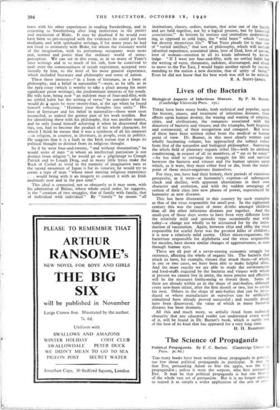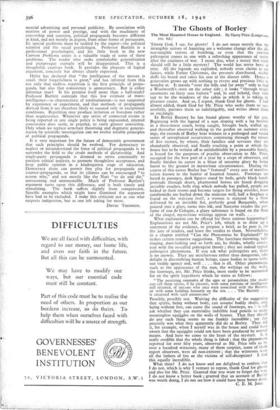The Science of Propaganda
Too many books have been written about propaganda in general; too few about political propaganda in particular. It may be that Eve, persuading Adam to bite the apple, was the first propagandist ; unless it were the serpent, who first persuad:d Eve. It may be that political propaganda is but one bran'-° of the, whole vast art of persuasion. But it is no longer enough to regard it as simply a wider application of the arts of coin-
mercial advertising and personal publicity. By association with motives of power and prestige, and with the machinery of censorship and coercion, political propaganda becomes different in kind, and not merely in degree, from other forms of persuasion. Its special problems must be tackled by the expert—the political scientist and the social psychologist. Professor Bartlett is a professional psychologist, and his little book in the new Current Problems series is a valuable study of some of these problems. The reader who seeks comfortable generalisation and picturesque example will be disappointed. This is a thoughtful, cautious book. It provides the pleasure of logical argument, concisely but always dearly expressed.
Hitler has declared that " the intelligence of the masses is small, their forgetfulness is great," and has inferred from this not only that endless repetition is the first principle of propa- ganda, but also that consistency is unnecessary. But is either inference true? Is his premise itself more than a half-truth? Professor Bartlett contends that this low estimate of mass- intelligence—so characteristic of totalitarianism—is not supported by experience or experiment, and that methods of propaganda derived from it are therefore likely to succeed only in exceptional conditions. Repetition may produce irritation or boredom rather than acquiescence. Whenever any series of connected events is being reported or any single policy is being expounded, internal consistency does seem, in practice, to carry greater conviction. Only when we replace armchair theorising and dogmatic general- isation by scientific investigation can we evolve reliable principles of political propaganda.
It is very important for the future of democratic government that such principles should be evolved. For democracy to neglect or misunderstand the force of political propaganda is to surrender the field to the crude methods of dictatorship. And single-party propaganda is doomed to strive continually to paralyse critical analysis, to promote thoughtless acceptance, and keep public opinion in a kindergarten stage of education. Democracy alone can permit free play for propaganda and counter-propaganda, so that its citizens can be encouraged " to reason why," and not merely like the Nazi " to do and die," unreasoning and unreasonable. Much of Professor Bartlett's argument turns upon this difference, and is both timely and stimulating. The book suffers slightly from compression. Specific examples which might have illumined the argument have had to be excluded. I make this criticism not as one who suspects indigestion, but as one left asking for more.
DAVID THOMSON.































 Previous page
Previous page